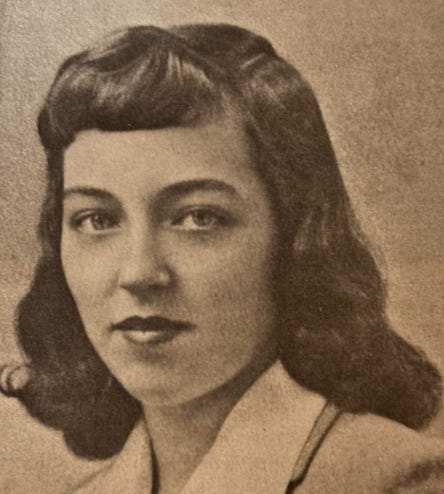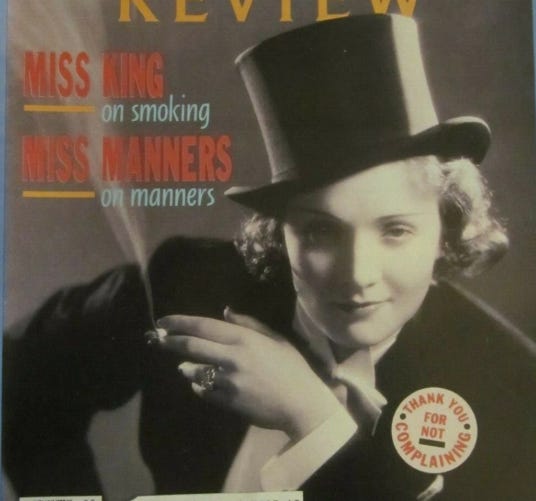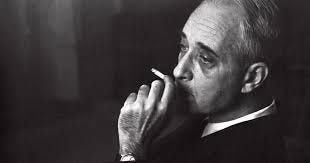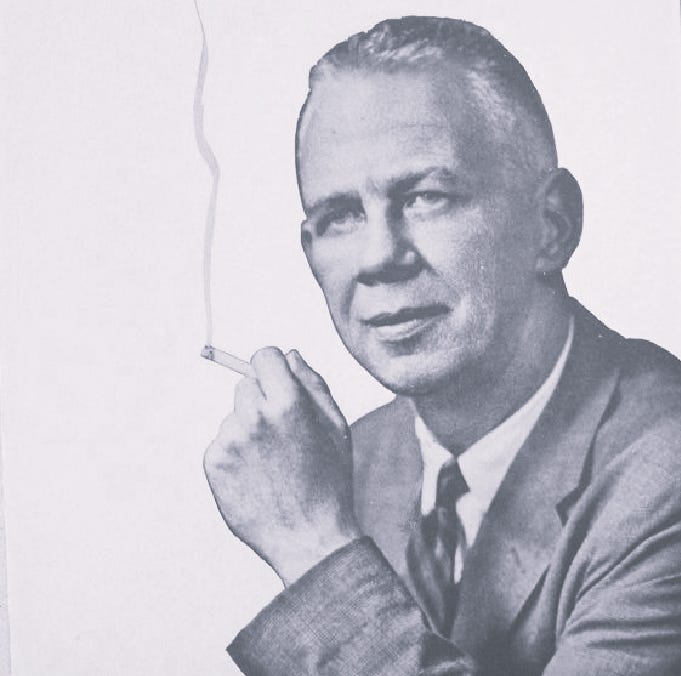A History of Smoking
The Right's Habit of Defiance
Is there a more intellectually incoherent political force today than the Make America Healthy Again Movement? MAHA combines real concerns about the widespread use of chemicals with cavalier approach to experimental drugs or outright quackery. Its adherents have a somewhat understandable if disagreeable paranoia about mainstream medicine while they confusedly pursue “natural” remedies or products on gut feeling. The ongoing “crank realignment” is very real in MAHA, as crunchy fringes from the anti-government left stumble into common cause with culturally “Don’t-Tread-On-Me” elements of the right.
Aspects of MAHA – the distrust of science, the pursuit of “natural” remedies, the resentment of bureaucrats and liberal killjoys, and ultimately fear of the medicalized state – remind me of an offbeat but long-standing minor theme in conservatism: the affirmative defense of smoking. (RFK, Jr. is reportedly a Zyn user.)
Conservative tobacco enthusiasts no doubt suffer from motivated reasoning. Nevertheless, they light on several core conservative themes. First, perhaps most appealing, is the appeal of living well and enjoying life while defying left-coded busybodies and rationalists. In 1958, for example, National Review published an ironical article by William F. Buckley’s sister, Jane Buckley Smith about quitting and unquitting smoking.
The anti-smoking arguments were “unanswerable,” she acknowledged, “until I gave up smoking.” She became stressed, gained weight, recovered (unfortunately) her sense of smell. By the end of the ordeal, she advised readers to take up smoking again. “With happy resignation you will light a cigarette, inhale deeply – and possibly choke. But persevere. By the third one the past agony-laden seem as though they never were.” She had a new mantra: “Today and every day I shall smoke. I shall never, never stop.”
More than thirty years later, National Review repeated the trick. This time it was the quirky Southern writer Florence King with a cover article titled “I’d Rather Smoke Than Kiss.” For King, who began smoking at twenty-six, cigarettes were a joyful part of life. All the more reason to defend them against prim anti-smokers. She recalled a smoking former lover and wrote, “Today when I see the truculent, joyless faces of anti-tobacco Puritans, I remember those easy-going smoking sessions with that man; the click of the lighter, the brief orange glow in the darkness, the ashtray between us—spilling sometimes because we laughed so much together that the bed shook.”
For conservative smokers, anti-smoking was yet another example of liberal rationalism, puritanism, and anti-humanism. “Hatred of smokers is the most popular form of closet misanthropy in America today,” King lamented. It even had a class war component, allowing liberal snobs to sneer at the tobacco-addicted working class.
For conservative bons vivants, the flavor of tobacco, the aesthetics of cigarettes, and smoke, the rituals and metaphysics of the pipe and cigar were all a natural, even God-given, part of life’s texture. In a 1997 classic of the genre, Michael P. Foley wrote a phenomenological treatment for First Things that concluded “Tobacco holds sway over the soul as much as it does the body.”
Meanwhile in the late 2000s, a young Helen Andrews spun a reactionary ethos out of the act of smoking. “We smoked on principle. It was reactionary, libertarian, spiritual, and aesthetic all at the same time,” she bragged. For Andrews’ gang, smoking was life. With appealing collegiate élan, she declared there would be “no cowardly, classless, un-seductive, or painfully earnest behavior unbecoming a smoker. You’re smoking a cigarette, so act like it.”
They thumbed their noses at the “modern cult of health” that technocratically boiled “the argument down to heart-disease rates.” Here the supposedly liberal impulse toward rationalist coercion impinged on personal dignity. The nanny state was coming for your pack of Lucky Strikes. As Foley wrote about this fixation of joylessness and hygiene: “it is no wonder that our most vigorous moral war waged today is against cigarette-smoking. Nor is it any wonder that this war’s only rival in intensity is the one in favor of “safe sex,” for condoms sterilize sex not only literally but figuratively as well.”
One of the arguments is that smoking may harm you, but it’s natural and pleasurable and we can’t let them take it from us. In a MAHA dog whistle, the conservative commentator and founder of Mayflower Cigars, Michael Knowles, told The Free Press that “Our liberal establishment wants everyone to be hooked on depression pills and pot and opioids,” he said. “The one drug they seem to object to is nicotine.”
The comparative unnaturalness and sterility of vaping makes me wonder if First Things or Compact would ever commission an essay about vaping and the soul (Foley: “The use of tobacco that does not involve fire, therefore, somehow corresponds to these nonhuman—or more accurately, subhuman—parts of the soul.” Vaping is a sterile mode of nicotine consumption that divorces the vaper from the authentic vessel of nicotine. At the same time, the reflexive contrarianism of those outlets, and the place vaping appears to have in the hearts of those slightly younger than me, mean I wouldn’t bet against it. Maybe we’ll see paeans to Zyn.
(Look: smoking is cool. The aesthetic appeal transcends political boundaries too. Diana Trilling described how she and her husband quit cigarettes after years of heavy smoking: “one of the things which made it difficult for us was that our self-image was being violated: we preferred to look like people who smoked.”)
If ritual, experience, pleasure, nature and living is the affirmation case for smoking, the anti-anti-smoking arguments focus on government overreach, the individual’s right to choose, and consciously rejecting liberal prudes. For example, in 1959, National Review warned that “in its Big Brotherly fashion,” the state would begin trying to curb smoking rates. But in inspired whataboutism, it compared smoking to drinking (they might have, as Christopher Buckley later did in Thank You For Smoking, compared it to Vermont cheese). And then what? The reductio ad absurdum. “Once you take away the people’s cranberries, tobacco, alcohol, coffee, tea, eggs, cream, cows, pigs, sheep, poultry, automobiles, trains, airplanes, ships and wars, a nervous reaction is inevitable and the public health will break down.”
By 1962, National Review granted that the science was, in fact, incontrovertible, and tobacco companies should not be able to obscure this. But, smoking and cancer weren’t contagious, so it wasn’t a public health problem but an individual choice. They warned against “busybodies” saddling the nation with “another Prohibition Era, with its inevitably attendant bootlegging, gangsterism, crime and moral decay.” The magazine’s mixed record on the War On Drugs raises questions about this breezy argument. Then, after the “Cigarette Report” published by Surgeon General Luther Terry (who smoked Larks, as well as pipes and cigars), National Review made the case that the choice to smoke was a matter of “first principles” bearing on the relationship between the state and society. “It’s none of Washington’s damn business what I smoke,” the magazine editorialized. Interference by the state will distort all of society. Let the state take the tax and let Americans take the risks.
By the time Florence King was writing her cigarette apologia in 1990, the abolitionists were getting the better of the public health argument. “To put a real damper on smoking and make it stick, the right of others not to die had to be invoked somehow, so ‘passive smoking’ was invented,” she complained. “The name was a stroke of genius” and individualist case “went up in smoke.”
Early this year, The Free Press published an article titled “Donald Trump, the Smokers’ President.” The online magazine seemed to think they’d discovered a new aspect of our transgressive right. “What one entrepreneur calls ‘the jihad from our liberal elite against nicotine’ has made smoking a conservative cause,” its subhead blared as author linked it to a post-COVID distrust of the state to know what’s best for us. “Tobacco makes you more conservative,” it quoted Knowles. Little did they know they had stumbled into a trope virtually as old as the conservative movement.
The trick here is that the authors of these pieces are being cute. Everyone knows there are bigger issues at stake than the right to rip a cig. The arguments – about liberal petty tyrants, about the overweening state, about a war on the good life or conservative mores –are repeated across issues. It’s fun to write about cigarettes. But over time, as a result of negative partisanship, things like smoking, or gas stoves, or vaccines, or whatever instant and reflexive culture war struggles. Likewise, the rote arguments become burned into the public consciousness – or at least, the conservative media eco-system – by sheer repetition.
But Ideas, as they say, Have Consequences, especially when combined with carcinogens habitually inhaled, sometimes in superhuman quantities, across decades.
After decades of reading conservative pro-cigarette material, the right-wing puritan Harry Jaffa got fed up. King’s 1990 article was too much for the Straussian cycling-fanatic. “As a public-health question, smoking dwarfs drug addiction, alcoholism, AIDS, suicides, and highway fatalities combined,” he intoned. “Does NR think that our commitment to freedom requires us to ridicule virtue and celebrate vice?”
Indeed, to bring this point home personally, we can return to Jane Buckley Smith who would “never, never stop” smoking. “In her prime [she] smoked maybe three packs a day.” (Smith’s brother Reid “consumed four packs of Kools—Kools!”) Smith spent the last decade of her life battling “gradual suffocation.” She, like Reid and William F. Buckley, suffered from emphysema. “By the time she died,” Christopher Buckley remembered, “she was down to something like 4 percent of lung capacity.”







I remember hearing Rush Limbaugh extol the health benefits of smoking and deny that nicotine had any addictive effect. He died of lung cancer at age 70.
I would further note that the Big Tobacco has long played a central role in financing right-wing causes. I saw this with my own eye when I worked for conservative think tanks. I would recommend this book on the subject: https://www.amazon.com/Poison-Tea-Tobacco-Invented-Captured/dp/1250076102/ref=sr_1_1
I reviewed the book here: https://www.bookforum.com/print/2302/how-the-conservative-movement-has-spent-and-organized-its-way-into-power-16083
This reminds me of what I read once, that a chambermaid in Whitehall Palace doused Sir Walter Raleigh with a pitcher of water when she saw him smoking, thinking she was saving him from burning alive.
This also vaguely rings a bell. There was some instance in the '60s, I think, where a lawyer played aloud a tape at a party that was somehow against the interest of NR in the matter of some legal case over smoking, but to play the tape was itself ethically questionable, and WFB wrote about it. But I can't remember the details of the incident or the name of the man who played the tape.
When my late in-laws married in 1946, he smoked a pack a day. She knew better than to badger him about it and merely asked that every time he bought a pack, he would give her the same amount of money, which she put in a glass jar.
At the end of a year, she had saved enough to pay for a trip for both of them from Memphis to Niagara Falls. When he realized how much he was spending, he quit cold turkey the next day.